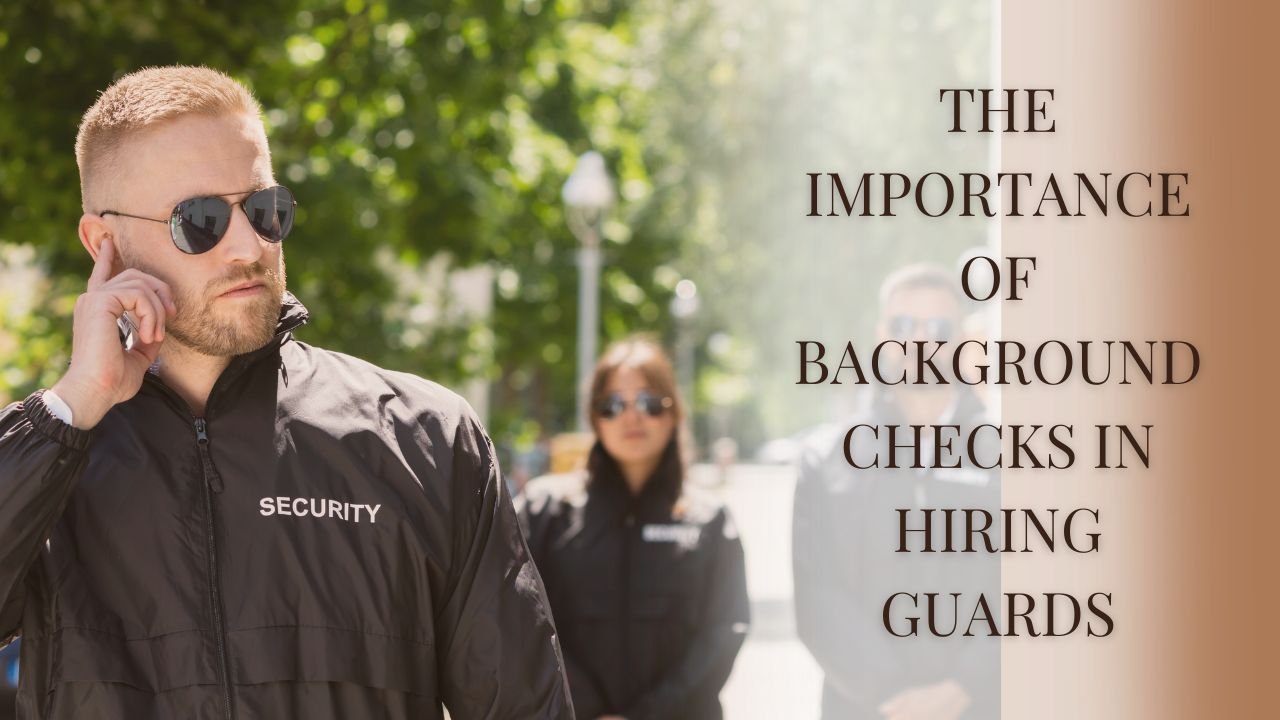Hiring security guards is not just about filling positions — it’s about entrusting individuals with the safety of property, people, and sensitive data. In this context, background checks are not a luxury; they are a critical line of defense.
A weak hiring process can lead to theft, negligence, reputational damage, or even legal liability. For organizations, conducting comprehensive background screening when hiring guards is a vital step in risk management, trust building, and operational integrity.
Why Background Checks Matter — The Core Benefits
1. Protect Against Internal Threats & Misconduct
Unfortunately, insiders represent a significant risk. According to industry reports, employee theft and fraud account for substantial losses. Employers who fail to vet individuals properly risk placing a guard with a hidden criminal record or tendencies toward dishonesty.
A background check helps reveal past criminal convictions, arrests, or misconduct that would disqualify a guard from trusted duty.
2. Ensure Reliability, Competence & Professionalism
Guards with falsified resumes or unverified credentials can undermine security operations. Background checks verify claims about education, training, work history, and professional licenses.
This ensures that your hires have the qualifications and experience they claim — critical when their decisions may carry serious consequences.
3. Preserve Reputation & Client Confidence
Clients expect security firms to deliver not just force but trust. If a guard turns out to be unreliable or criminal, the fallout can harm your brand.
Demonstrating that every guard is rigorously screened sends a message of professionalism and reduces risk of negative publicity or client loss.
4. Mitigate Legal Exposure & Negligent Hiring
If an employee commits wrongdoing and the employer failed to perform due diligence, courts may hold the organization liable under negligent hiring.
A documented, consistent, and compliant background check process helps protect against lawsuits and shows you exercised responsible oversight.
5. Comply with Industry & Regulatory Requirements
Many jurisdictions require background checks for security personnel, especially for armed guards or those operating in regulated sectors (e.g. financial, government, critical infrastructure).
Screening — including criminal history, drug tests, credit checks — is often mandated by law. Using proper checks ensures legal compliance and avoids fines.
What Types of Checks Are Typical for Guard Hiring?
Security guard background screening tends to be more stringent than average roles. Key checks may include:
| Type of Check | Purpose / What It Reveals |
|---|---|
| Criminal history screening | Identifies convictions, arrests, pending charges — ensures no violent, theft, fraud, or disqualifying records |
| Employment verification | Confirms prior roles, performance, and job stability |
| Education & certification verification | Validates claimed training, licensing, or security certifications |
| ID verification / identity checks | Confirms identity, addresses, SSN or national ID – prevents identity fraud |
| Drug and substance testing | Ensures guards are not impaired on duty |
| Credit / financial checks | Reveals financial pressure or instability that might make a guard vulnerable to bribery or theft |
| Driving record / motor vehicle history | If a guard drives vehicles or patrols, this ensures responsible driving history |
| Reference checks | Gathers insights on character, reliability, ethics from former employers or contacts |
How to Conduct a Proper Screen — Steps & Best Practices
- Develop a consistent screening policy
Define which checks apply to every guard role and ensure they align with legal standards and industry norms. - Obtain clear disclosure and consent
Before screening, legally notify the candidate and secure their signed consent. - Collect & analyze data from reputable sources
Use accredited screening agencies, courthouses, and official records. Avoid unverified sources. - Evaluate red flags carefully & fairly
Not every past offense should automatically disqualify. Consider the nature of the offense, time elapsed, and relevance to guard duties. - Adverse action process if rejecting a candidate
Inform the candidate, provide a copy of the report, and allow them to dispute information. - Ongoing / periodic rechecks
Even after hiring, perform periodic checks or audits to ensure continued fitness (especially for long-term positions). - Documentation & record-keeping
Retain screening documentation securely for defense against legal claims. Use consistent criteria and track decisions.
Real-World Context & Trends
- Many businesses report that employee misconduct accounts for 20–30 % of internal theft and fraud losses.
- Industry surveys show over 95 % of employers use some form of background screening in hiring.
- In security services, issues such as a guard with a criminal past working in sensitive environments spark compliance risks and trust issues.
- The most severe security breaches often trace back to insiders unchecked by screening.
These patterns underscore that for high-risk roles like security, skipping background checks can invite disastrous outcomes.
Challenges & Ethical Considerations
- Fairness vs Safety: Balancing rehabilitation opportunities against security risks is delicate. Hiring policy should avoid blanket bans on all criminal history, instead assessing relevance and timing.
- Privacy & Consent Laws: Background checks must comply with privacy, labor, and data protection legislation; misuse can lead to legal liability.
- Cost & Resource: Comprehensive screening can be costly — but that cost pales compared to losses from a security breach or lawsuit.
- False Negatives / Errors: Reports may contain inaccuracies. A process for candidate dispute is crucial.
- Bias & Discrimination Risks: Use uniform, job-relevant criteria to avoid disparate impact; avoid decisions based purely on protected traits.
Sample Screening Criteria for Guard Roles
| Guard Level / Role | Mandatory Checks | Additional Recommended Checks |
|---|---|---|
| Unarmed Site Guard | Criminal record, ID verification, employment history, reference check | Drug test, credit check (if controlling valuables), driving record |
| Armed / High-Security Guard | All unarmed checks + firearm licensing confirmation | More extensive criminal history, stricter credit review, periodic rechecks |
| Executive / VIP Protection | Deep background checks, financial history, social media audits | Psychological evaluation, counterintelligence check, foreign travel history |
Hiring a security guard without conducting a thorough background check is akin to leaving your vault door unlocked.
In a field where trust, integrity, and reliability are non-negotiable, skipping or skimping on screening exposes any organization to risks — financial, operational, reputational, and legal.
A robust background check process helps ensure that those you entrust with protection are, in fact, worthy of that trust.
From criminal records to identity verification, employment history to credit assessments, each check uncovers a piece of the candidate’s profile. Combined, they form a comprehensive picture vital for sound hiring.
While cost, complexity, and fairness concerns must be considered, the investment in safety far outweighs the dangers of oversight.
FAQs
Are background checks mandatory for security guards?
In many areas, yes — particularly for armed guards or roles with government contracts. Legal, licensing, and security requirements often demand criminal, drug, and license checks.
What if a candidate has a minor crime in the past?
It depends on the nature, severity, how long ago it occurred, and whether it’s relevant to guard duties. A fair assessment — not automatic exclusion — is key.
How often should rechecks be done for guards?
Best practice is at least annually or biannually, or after major events (e.g. arrest, promotion). Some roles may require continuous or random rechecks.




